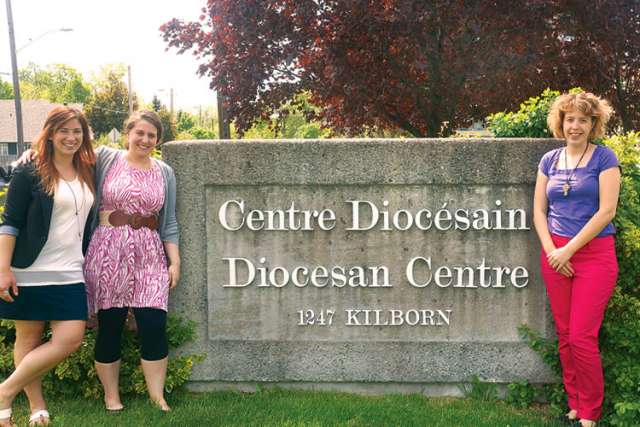Danielle Breffitt, a Catholic Christian Outreach (CCO) missionary in communications, Katherine Church, a physiotherapist, and Sarah Du Broy, a communications officer for the Ottawa archdiocese, participated in the first of five training sessions offered by the Salt + Light Media Foundation. They joined about 20 participants from Ontario and the Salt + Light TV staff for sessions led by Salt + Light CEO Fr. Thomas Rosica, CSB, who is also a consultor on the Vatican’s Pontifical Council for Social Communications, English-language assistant to the Holy See Press Office and a member of the Social Communications Commission of the Canadian Conference of Catholic Bishops.
“It has become more and more obvious to us at Salt + Light that there is a very distinct need for articulate persons to explain the significance of the massive papal transition we experienced last year and what Pope Francis is writing, saying and doing,” said Rosica.
The training sessions originated in a proposal made in 2013 to the Assembly of Catholic Bishops of Ontario and later to the Canadian bishops’ conference. The first training session in April attracted about 20 young people from seven Ontario dioceses and two ecclesial movements. It took place before the canonizations of Popes John XXIII and John Paul II, which was highlighted as the type of event young people could prepare themselves to speak about for the media.
Rosica stressed the importance of the young people being “proactive and not in a constant reactive mode to various challenges and ecclesial crises.”
The group-in-training has been called “Catholic Perspectives” to maintain a “unique Canadian identity,” Rosica said. He noted the success of similar groups such as Catholic Voices UK — which recently launched a Canadian chapter — and Catholic Comment Ireland that prepared young, lay Catholics to comment to the media in advance of Pope Benedict’s 2010 visit to the UK and the 2012 International Eucharistic Congress in Dublin, respectively.
Rosica said the young people must subscribe to Catholic teaching and “want to share the Catholic worldview in an open, confident, friendly and respectful way.”
Du Broy said if media contact a diocese they might prefer to talk to ordinary Catholics who are well-informed rather than a bishop or a priest. Though they would not claim to represent the diocese officially, Du Broy said a number of discussion areas the young people hope to be able to speak about are same-sex marriage, Pope Francis’ words, homilies and gestures, Theology of the Body, the role of women in the Church, understanding rites and sacraments, the role of clergy and religious and why they choose to follow the teachings of the Church.
But opportunities to evangelize do not just come through the media, Church said. Any time there is a possibility to evangelize at work, among friends, “you have to think before you answer,” she said, noting how Pope Francis makes his message “stick” by being simple and clear.
“The Church believes what might not be popular,” said Breffitt. But the Holy Spirit is “behind us” when we express our faith. “We don’t have to be afraid.”
“We always need to pray when we are asked questions,” said Du Broy. “We have to pray before we answer.”
“It’s about witnessing, not winning an argument,” said Breffitt.
Breffitt said they know on many of the topics they would have to seek advice and do some brushing up before appearing on the media so they “don’t say something not correct.”
The training gave them practical tips on how to approach being interviewed, punctuated with examples from Rosica’s experience fielding interviews on the resignation of Pope Benedict and the election of Pope Francis.
Breffitt grew up in Ottawa, went to church as a child, but stopped when in middle school. In Grade 10 or 11 she was invited to a Catholic youth group. It was there she had the opportunity to experience God’s love for her.
“I made a personal decision to follow the Lord at 16,” she said. She served for two years as a missionary for NET Ministries, and then joined CCO where she has entered her third year.
“I’ve been seeing peoples’ lives change,” Breffitt said. “That definitely helps me in my faith. Faith isn’t lived unless it’s shared.”
Though about two-thirds of young adults leave the Catholic Church at or after university, Breffitt credits having a strong Catholic community for cementing her faith and challenging her to be “a missionary disciple.”
Church, a cradle Catholic, was 16 years old when the principal of her school asked her to help out when the World Youth Day Cross came to Ottawa in 2002. She didn’t realize she would have to play the part of Mother Elizabeth Bruyère, wearing a costume and delivering some lines in front of 18,000 people at the Canadian Tire Centre. The WYD Cross was on centre ice on a revolving platform. The only way she could deliver her monologue was to cling to the cross so she would not fall off, she said.
She felt extremely shaky, but this event cured her of any fear of speaking in public, she said.
Du Broy experienced a deep conversion at the age of eight when her parents took her to a charismatic prayer meeting. Her mother noticed how she was responding and told her to close her eyes and ask God to come into her heart. She felt God’s presence very powerfully and kept going to Mass and staying involved in the Church, going on to get a degree in journalism at the University of Ottawa.
“I always knew I would work for the Church in media,” she said.
“God wants what’s best for us,” Du Broy said. “His teachings are for our good.”


